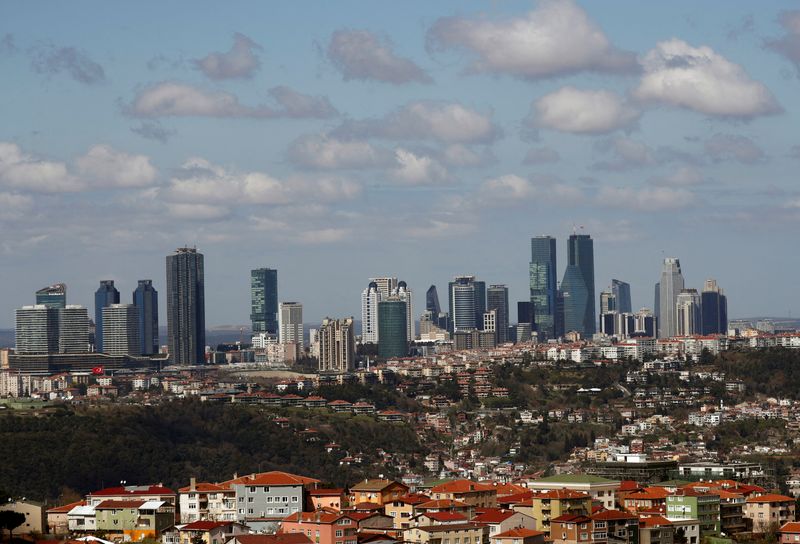ISTANBUL (Reuters) - Turkey's highest inflation rate in decades is expected to ease somewhat to around 70% by year-end, and the central bank is seen holding its policy rate steady for at least another year, a Reuters poll showed on Tuesday.
Inflation in Turkey has soared in the wake of a December currency crisis that was caused by a series of unorthodox interest rate cuts, and which ended up stripping 44% off the lira's value against the dollar last year.
Annual price rises neared 80% last month, a 24-year-high, due to the monetary easing, currency depreciation and the spike in global commodity prices following Russia's invasion of Ukraine.
Annual inflation is expected to climb further to 84.7% at the end of the third quarter, based on the median estimate, before starting to descend due to so-called base effects from the previous year, the Reuters poll showed.
President Tayyip Erdogan has said the inflation burden on households will ease around the end of first quarter of 2023.
But the median estimate in the poll showed it slipping only to 50.8% in that period. By the end of the second quarter - when presidential and parliamentary elections are due - inflation is seen at 42.3%.
Inflation was seen dipping to 34.4% by the end of 2023, and to 20.0% a year later, according to the poll.
Despite the soaring costs of living, the central bank is seen holding its policy rate at the current 14% until the end of next year at least, the poll showed. That would be in line with the government's programme that prioritises low rates to boost credits and exports.
Some economists in the poll saw the central bank changing direction and hiking its policy rate despite pressure from Erdogan for monetary stimulus.
Tera Yatirim's Chief Economist Enver Erkan said the bank would continue pursuing loose policy at a time when central banks around the world are getting tighter in their fight against inflation.
"We do not expect any action from the Central Bank for a while, and we foresee a policy expansion in line with the growth-oriented targets of the economy management for at least one more quarter," Erkan said.
Erdogan's economic programme stresses exports and credit to fuel growth, despite widespread criticism of the policy from economists and opposition lawmakers. Opinion polls show the economic strain is hurting his support.
Turkey's economy meanwhile bounced back from the COVID-19 pandemic to grow 11% last year, its highest rate in a decade. But it has already slowed and should continue to do so, economists say.
The median estimate of 36 economists for gross domestic product (GDP) growth in 2022 was 3.3%, compared to 3.0% in the previous poll. The medians for 2023 and 2024 were 3.2% and 3.0% respectively.
The economic programme aims to ease Turkey's chronic current account deficits with rising exports, but surging energy import prices have more than offset that.

Economists have revised up their estimate for the current account deficit this year to a median 5.5% of GDP in this month's poll, compared to 4.4% in an April poll. They see it at 3.5% in 2023, from 2.8% previously.
(For other stories from the Reuters global long-term economic outlook polls package:)
(Polling by Milounee Purohit and Vijayalakshmi Srinivasan; Writing by Ezgi Erkoyun; Editing by Jonathan Spicer)